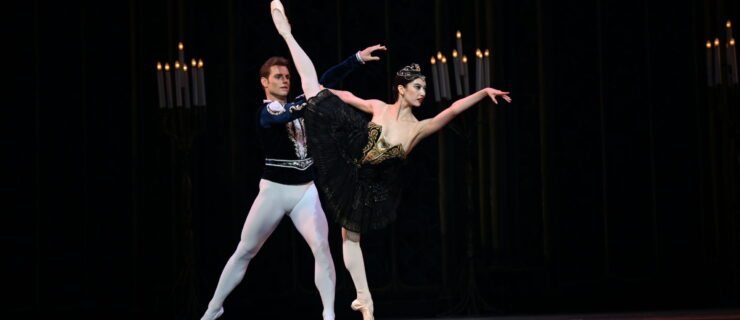Oklahoma Rising
It was Tulsa Ballet Artistic Director Marcello Angelini’s dream to build a world-class company from the moment he decided to give up his career as a dancer and take artistic control of TB in 1995. Some would say that he has succeeded, and perhaps because he’s still a dancer at heart, his company is one where dancers thrive.
“Because the vision here is so wide,” says principal dancer Ma Cong, a company member since 1999, “and because Marcello is always looking to discover each individual’s talents, you get the feeling that here, with Tulsa Ballet, you can do anything.”
TB’s latest endeavor is a series devoted to world-première works, presented in the company’s own 300-seat theater. The theme for the series debut, which is set for late April, is “About Tango.” Award-winning Korean choreographer Young Soon Hue, the tango team of Fernanda Ghi and Guillermo Merlo, as well as Cong, will each contribute a new work. Cong has already created three works for the company, including a Carmina Burana on the opening program of the 50th anniversary season last year.
The new theater is part of an extensive, $17.5 million capital improvement and endowment campaign planned to secure the company’s future, not simply as presenters, but as creators of dance.
“It’s one thing to bring the best that exists to your audiences,” says Angelini. “But just as important is the responsibility to help the world of dance grow. That’s something you do through new creations.”
The smaller theater will be much easier to fill than a 2,400-seat hall, which means more performances and longer contracts for the dancers. “About Tango” will run for 10 performances, complete with “talkback” sessions with the choreographers following each evening and opportunities for audiences to meet the dancers.
“When I came here, the dancers’ contract was for 27 weeks,” says Angelini. “For this season, the contract is 38 weeks. Next season, we’re offering a 39-week contract. And because we are doing our new series in our own theater, it will be practically
self-supporting. Regardless of what happens around us, this series of creations will be able to continue.”
It’s an innovative idea—but no more so than the founding of Tulsa Ballet 51 years ago by the late Roman Jasinski and his wife, Moscelyne Larkin. The two helped establish the idea of a regional ballet company. Now TB is redefining what can be expected of ballet companies outside the major metropolitan areas. However, even while Angelini brings in the best international choreographers, his company remains true to its hometown and takes its relationship to the city it serves seriously.
“I had heard about Tulsa Ballet, but knew absolutely nothing about the city before I came here. You can tell the people here really love and support the company,” says soloist Wang Yi, who joined TB in 2006 after stints with Zurich Ballet and Universal Ballet of South Korea. “That’s always a good thing for dancers, to know that the passion you bring to the stage is appreciated. It makes you give more of yourself.”
Tulsa may be a welcoming city, but it is Angelini’s discerning approach that turns dancers into artists. Soloist Ashley Blade-Martin says that when she came to TB, she had been accustomed to directors harping on technique. “But Marcello—who is just as picky about technique—spends more time watching our faces and upper bodies,” she says. “There is an exhausting and relentless pursuit of the highest artistic standards here.”
While the company is ranked, dancers who are deemed ready are given the chance to try leading roles. Soloist Karina Gonzalez, who joined the TB corps in 2005, is a good example. Before her first season ended, she had danced the lead role in Angelini’s staging of Swan Lake, alternating with former Royal Ballet prima ballerina Viviana Durante.
“I never thought of myself as that kind of dancer—someone with that long line who can be the perfect swan,” says Gonzalez, who this summer won a silver medal at the New York International Ballet Competition. “When I started rehearsing Swan Lake, it took me a while to stop thinking in that way. Fortunately I had a lot of help from Daniela [Buson, former TB ballerina turned ballet mistress] to find the confidence to do the role and even enjoy dancing it. Now it’s one of my favorites.”
Aspiring dancers are attracted to TB not only for the quality of the work and opportunity to grow; the company’s challenging repertoire is also a lure. In June 2007, some 460 dancers auditioned for the chance to perform works such as Jerome Robbins’s The Concert, Bruiser by Stanton Welch, Hans van Manen’s Black Cake, Remansos by Nacho Duato and Andre Prokovsky’s The Great Gatsby, which are all on the 2007-08 lineup.
And the company is also developing an international profile. In 2002, TB was the sole U.S. representative at the summer-long Sintra Festival in Portugal, and in April 2007, it was the only U.S. company to perform as part of the Belgrade Dance Festival in Serbia. Plans for performances in South Korea and Italy, as well as a long-awaited trip to New York City’s Joyce Theater within the next 18 months, are also in the works.
Angelini’s dream of creating an exceptional company may not have been the easiest thing to realize, but along the way he’s proved that it’s not where you work that matters, it’s how you work. That’s a lesson that Blade-Martin and her husband, principal Alfonso Martin, learned through experience.
“I had always wondered what it would be like working for one of the big companies,” says Martin. In 2005 the couple (who both joined TB in 1998) decamped for Boston Ballet. “There were a lot of good things about being with Boston Ballet—the pay was good, we both danced a lot, had good roles. But one day we sat down, looked at each other and said, ‘This isn’t working.’”
When the 2006-07 season began, the couple was back in Tulsa. On the surface, it would appear to have been a step backward. But, as Martin puts it, it was the only way to achieve their dream.
“In a large company, you get the sense that they are just maintaining what they created,” he says. “But with Tulsa Ballet, you get the feeling that this company is doing something important in the world of ballet, and I want to be a part of that.”
Blade-Martin agrees, “Sometimes Marcello likes to tease that we divorced him for a year, but nothing could be farther from the truth. What’s important is not that we left, but that we came back.”
James D. Watts, Jr. writes for the Tulsa World in Oklahoma.





